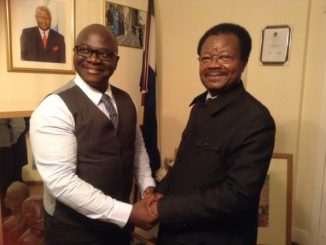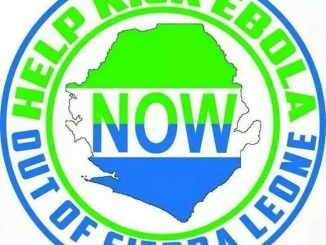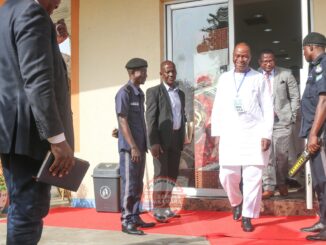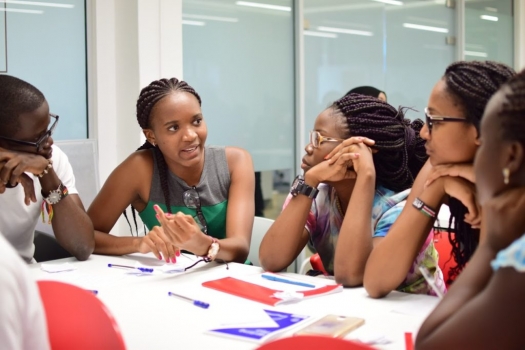
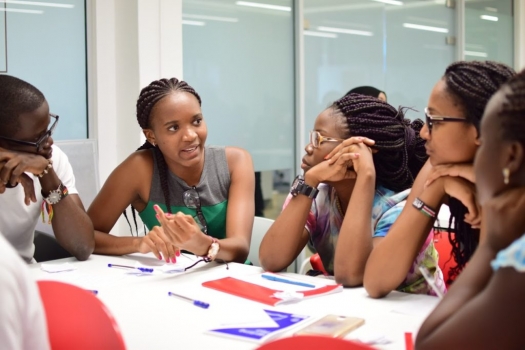
Thanks to a unique fellowship at the United Nations Economic Commission for Africa (ECA) as an Ibrahim Leadership Fellow, Marian Yinusa is making an impact in the lives of school-age girls in her birthplace of northern Nigeria.
Currently a senior financial economist at the Africa Development Bank (AfDB), Ms. Yinusa also runs the GENN Initiative (Girls Education in Northern Nigeria) foundation, which pays for young girls to go to school.
She would probably say her many accomplishments were a surprise—even to her!—yet she was strongly motivated to help girls break the barriers keeping them from school. “I wanted to do something about it,” she told Africa Renewal.
While at the ECA in Addis Ababa, she followed keenly the day-to-day work of senior officials, which led to more responsibility and a promotion at her job.
700
students from 45 countries have received training in the past 10 years.
According to the Mo Ibrahim Foundation, sponsor of the Mo Ibrahim Foundation Leadership Fellowship Program, the purpose of the program is to mentor future African leaders by offering them an opportunity to work at the highest levels of the AfDB, the ECA or the International Trade Centre (ITC).
Ms. Yinusa is one of 18 fellows so far to benefit from the leadership programme. She describes her experience as “learning by observation.”
Eddy Oketch, the seventh of eight siblings, who dropped out of school to provide for his family, parlayed his intuitive organizing ability into an Ibrahim fellowship in 2017.
Carl Manlan, who was a fellow in 2014, remembers, “I shadowed [the work of senior officials] and was in most of the ECA executive secretary’s meetings.”
Mr. Manlan currently heads the Ecobank Foundation, the charitable arm of the West African retail and investment bank with headquarters in Lomé, Togo. After his fellowship, Mr. Manlan served as executive secretary of the Africa against Ebola Solidarity Trust, a charity that partnered with the African Union between 2014 and 2015 to mobilise funds to train and deploy African health workers to help fight Ebola in Guinea, Liberia and Sierra Leone.
Aside from the Ibrahim leadership fellowship, prominent leadership training initiatives for young Africans include the African Leadership Initiative, the African Leadership Institute, the Young African Leaders Initiative, the African Leadership Development Program, the Africa Science Leadership Programme and the African Leadership Academy (ALA).
ALA is a pan-African high school based in Johannesburg, South Africa, where more than 700 students from 45 countries have received training in the past 10 years.
Leaders of tomorrow
“Africa does not need leaders who are 75 or 65 years old. We need leaders who are young‚ vibrant‚ innovative and who the continent’s youth can relate to,” declared Graça Machel, widow of South Africa’s iconic anti-apartheid fighter Nelson Mandela, at the celebration of the 10th anniversary of ALA in Johannesburg in February.
The Sudanese billionaire entrepreneur and philanthropist Mo Ibrahim has decried the entrenchment of aging African leaders who sideline younger generations, fighting tooth and nail to hang on to power when they’re past their prime.
Fred Swaniker, a leadership development expert and cofounder of ALA, says he established the academy because his experience growing up in countries such as his native Ghana, the Gambia, Botswana, South Africa and Zimbabwe made him realize the difference that educated leadership makes in a country.
He chastises post-independence leaders who “brought nothing but havoc to Africa,” but praises leaders such as Paul Kagame of Rwanda and the late Nelson Mandela of South Africa who he says have provided purposeful leadership for their countries.
Mr. Swaniker envisions a generation of young African leaders who will be able to create prosperity.
The Mo Ibrahim Foundation’s Leadership Fellowship and ALA address leadership training differently. The six-year-old fellowship doesn’t involve academic training or seminars.
With a goal of making the youth of today the leaders of tomorrow, ALA is setting up a network of leadership colleges across the continent, and hopes to train three million young African leaders over the next 50 years, Mr. Swaniker says. The first campus was opened in Mauritius in 2015 and the second in Rwanda in 2017.
Educate, observe and learn
Those discussing Africa’s problems usually put the spotlight on the continent’s inadequate electric power, deep and entrenched poverty, insufficient or underpaying jobs and slow pace of industrialization—and on ways to mobilize resources to address these challenges. There is a need for good leadership, said Sam Adeyemi, a leadership consultant, during an online debate at the World Economic Forum on Africa 2017.
Contributing to the same debate, Mr. Swaniker remarked that “great leaders aren’t born—they’re made,” and added that the deliberate training of “leaders who take societies to great heights” is what makes most nations successful. Both speakers repeatedly mentioned a need to ramp up leadership training for young Africans.
In retrospect, both leadership training beneficiaries, Ms. Yinusa and Mr. Manlan, believe that hands-on experience at multinational organizations benefited them as young professionals. Mr. Manlan says the fellowship equipped him with the requisite knowledge and experience to shoulder increasing managerial duties at the international level. He would therefore like other institutions to provide more such programmes.
Jacqueline Musiitwa, who received a fellowship at ITC in 2012, now heads the Ugandan branch of Financial Sector Deepening, a UK government-funded financing programme for reducing poverty in sub-Saharan Africa. Having previously attended many short leadership programmes and seminars, she “immediately jumped” at the opportunity to go to ITC. “Of all the training that I attended, this was the only one that offered real-life professional experience, and it’s the best so far,” she says.
Ms. Musiitwa had trained as a lawyer and in 2007 founded the Hoja Law Group, a legal consultancy on corporate governance, commercial and public law issues that operates in Kigali and New York. She participated at the World Economic Forum in 2011 as a Young Global Leader, and now juggles legal practice with other jobs. Yet she feels Africa does not provide enough leadership development opportunities for young professionals.
Nudging the elders
In addition to formal leadership training programmes, Africa’s current leaders also need to contribute to the development of the young by demonstrating good leadership skills, analysts say.
In February former Liberian president Ellen Johnson Sirleaf won the Mo Ibrahim Prize for Achievement in African Leadership for leading her country’s recovery, through reconciliation and nation-building, after years of bloody conflict.
Launched in 2006, the prize is meant to promote good governance and peaceful political transitions by recognizing and celebrating African presidents who, according to the Mo Ibrahim Foundation, “have developed their countries and strengthened democracy and human rights” and are “exceptional role models for the continent.”
Ms. Sirleaf handed over power to 51-year-old George Weah in January.
But there appears to be a dearth of exceptional political leadership; over a decade of its existence, except for Mr. Mandela, who was given an honorary award, only five leaders have met the prize’s criteria: Ms. Sirleaf (2018), Joaquim Chissano of Mozambique (2007), Festus Mogae of Botswana (2008), Pedro Pires of Cabo Verde (2011) and Hifikepunye Pohamba of Namibia (2014).
Between academic training championed by ALA and real-life experience advanced by the Ibrahim leadership fellowship, there appears to be “room for a lot more” efforts at training young leaders, Ms. Musiitwa says.

